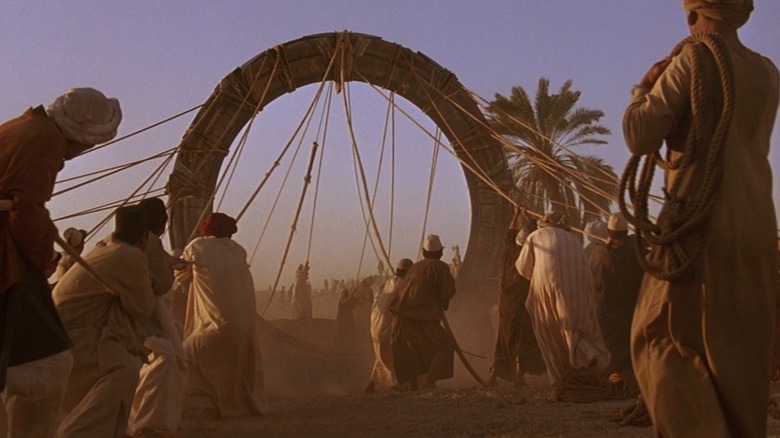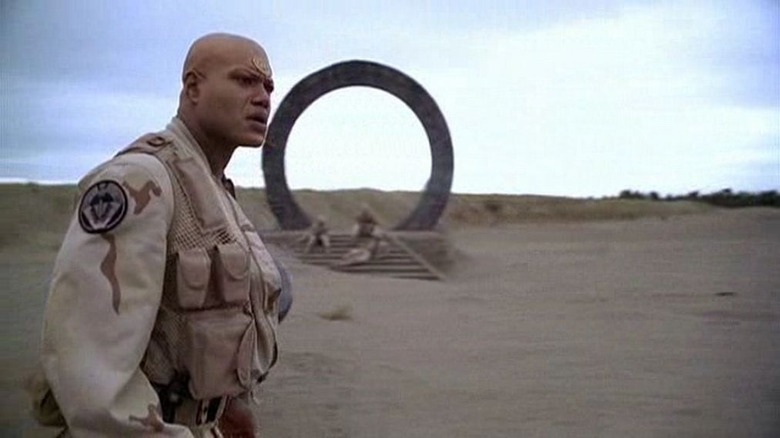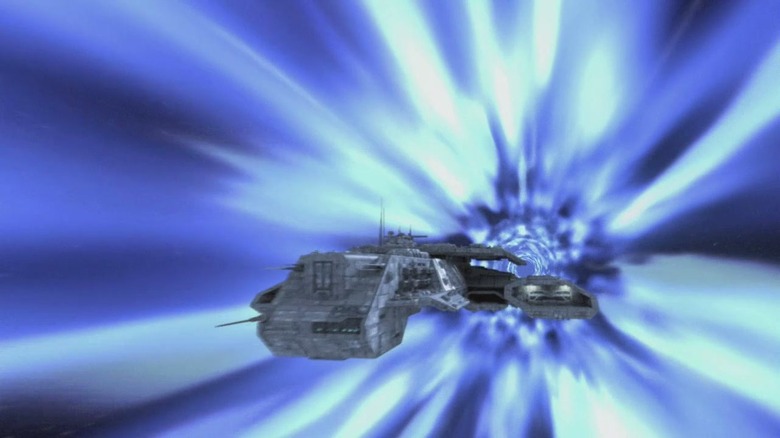The Correct Order To Watch The Stargate Franchise
In director Roland Emmerich's 1994 sci-fi thriller "Stargate," a mysterious metal ring, about nine feet wide, is discovered in the remote ruins of Egypt. The ring is found to be a mysterious technology that, when arranged properly, can open a doorway to a distant planet. Actors like James Spader and Kurt Russell pass through the Stargate and find themselves on a distant alien world called Abydos. Everything in Abydos looks like ancient Egypt, and we soon learn that the Abydosians once used the Stargate to visit Earth, enslave humans, and set up ancient Egyptian culture. The villain of the film is Ra (Jaye Davidson), an ancient alien who uses human bodies to extend his life.
There's a lot of cool design and slick special effects in "Stargate," but the alien mythology isn't explored thoroughly enough. Like most of Emmerich's films, it makes big swings visually yet never emerges from the realm of corny melodrama. Regardless, it was pretty well-received upon its theatrical release, grossing almost $200 million internationally on a (then relatively high) $55 million budget. Critics were only mildly impressed; "Stargate" only has a middling 54% approval rating on Rotten Tomatoes, with some noting Emmerich's overreliance on special effects. If only we knew in 1994 what we know now.
A small segment of the population glommed onto "Stargate," however, and a full-blown pop culture cult formed. In 1997, the fandom had grown to such a fever pitch to warrant a TV spinoff called "Stargate SG-1." From there, several other spinoffs and TV projects followed, most recently in 2018.
To suss out the chronology, we are here to provide a guide as to how best to absorb the franchise. See below for more details.
How to approach the Stargate franchise
The entire "Stargate" franchise includes the inaugural movie, followed by three TV shows, two more TV movies, and then two additional TV shows. "Stargate" fans — sometimes called Gaters — know all about the various shows and could likely explain the very complex lore involved in them. Outsiders, meanwhile, may be surprised to learn just how much "Stargate" media there is in the world. It's best, then, to watch the franchise in its release order, which is complicated as — like "Star Trek" in the 1990s — some of the installments overlap. With that being said, here is our recommended approach:
- "Stargate" (1994)
- "Stargate SG-1" (seasons 1 through 5, and season 6 through episode "Prometheus")
- "Stargate: Infinity" (September 24, 2002 — March 23, 2003)
- "Stargate SG-1" (the rest of season 6 and season 7, which ended March 19, 2004)
- "Stargate: Atlantis" (July 16, 2004 — January 9, 2009)
- "Stargate SG-1" (seasons 8, 9, and 10, which ended on August 26, 2007)
- "Stargate: The Ark of Truth" (March 11, 2008) — a spinoff of "SG-1" that aired during season 5 of "Atlantis"
- "Stargate: Continuum" (July 29, 2008) — a spinoff of "SG-1" that aired during season 5 of "Atlantis"
- "Stargate Universe" (October 2, 2009 — May 9, 2011)
- "Stargate Origins" (February 15, 2018 — March 8, 2018)
Note that "Stargate: Infinity" is an animated series that some Gaters don't consider canonical. "Stargate SG-1" and "Stargate: Atlantis" both involve military grunts passing through Stargates to visit distant alien worlds, while "Stargate Universe" is more of a space opera set on board a distant Earth spacecraft. "Universe" lasted for two seasons on TV but ultimately produced 34 "webisodes," which serve as a miniature, concurrent spinoff of their own.
"Stargate Origins," meanwhile, is a prequel miniseries that's set in 1939 and composed of 10 episodes (each of which is 10 minutes long).
The lore of Stargate
Like all long-running sci-fi franchises, the lore of "Stargate" is wide and deep. Here is the speediest possible primer, although you might want to contact your local Gater for a more detailed, thorough explanation.
"SG-1" was a massive hit that lasted for 214 episodes over 10 seasons. The series takes place after the 1994 film and follows a team of exploratory military grunts as they pass through the Stargate to visit a variety of distant planets. Their goal is to salvage alien weapons technology to defend themselves from an evil alien species called the Goa'uld (the same species as Ra). In the show's final two seasons, the military grunts find that a new threat has arisen in the form of the Ori, a species of ancient zealots who seek to control others with their religion. The Ancients are key players in the "Stargate" universe, as it was they who — being ancient predecessors to humanity who lived millions of years ago — constructed the Stargates to begin with.
"Stargate: Atlantis" is, as the title dictates, about the alien species that helped build the ancient undersea country. Indeed, many ancient cultures and theogonies play into the "Stargate" mythos. In addition to the gods of Egypt, the gods of Norse mythology also appear. The central bad guys in "Atlantis" are the Wraith, a hive mind of immortal species.
As indicated earlier, "Stargate Universe" is a more "Star Trek"-like show, as it doesn't involve Stargates and takes place on a space-bound vessel. It also doesn't skip around in time, taking place mostly in the present.
There is, of course, much, much more to know about "Stargate" and its mythology. Find a Gater and bend their ear. They'll happily fill you in.


